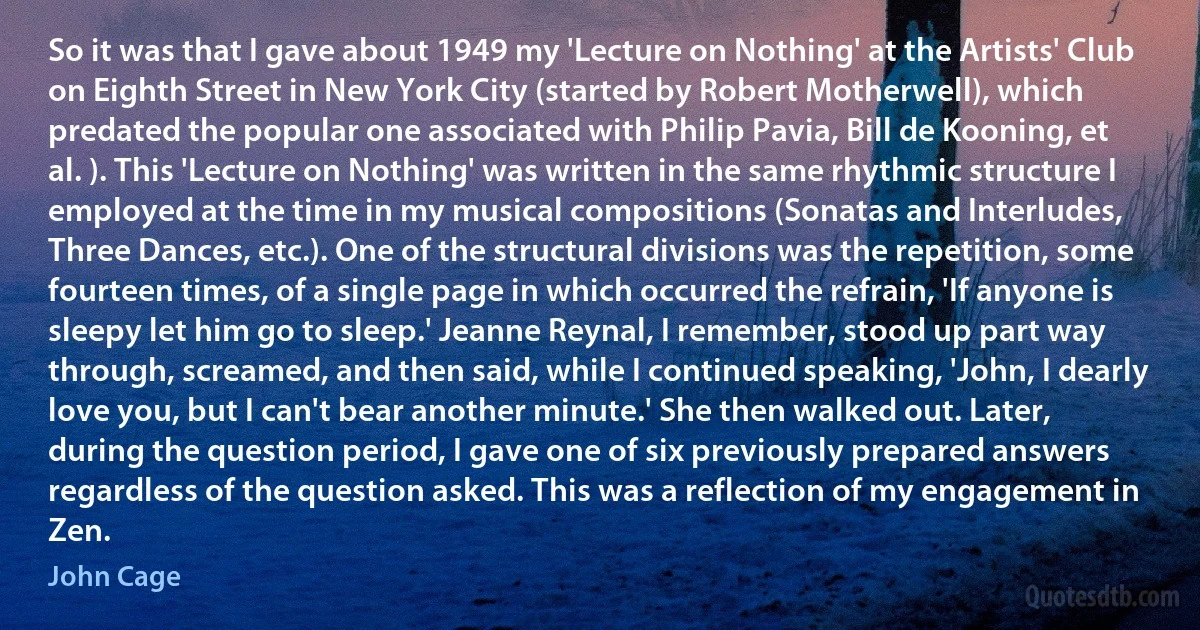
So it was that I gave about 1949 my 'Lecture on Nothing' at the Artists' Club on Eighth Street in New York City (started by Robert Motherwell), which predated the popular one associated with Philip Pavia, Bill de Kooning, et al. ). This 'Lecture on Nothing' was written in the same rhythmic structure I employed at the time in my musical compositions (Sonatas and Interludes, Three Dances, etc.). One of the structural divisions was the repetition, some fourteen times, of a single page in which occurred the refrain, 'If anyone is sleepy let him go to sleep.' Jeanne Reynal, I remember, stood up part way through, screamed, and then said, while I continued speaking, 'John, I dearly love you, but I can't bear another minute.' She then walked out. Later, during the question period, I gave one of six previously prepared answers regardless of the question asked. This was a reflection of my engagement in Zen.
John CageRelated topics
anyone bear city club john later love minute nothing philip question reflection say single six sleep speaking stand street structural three times time way while write etc divisionsRelated quotes
When I was six, we moved to the small town of Stratford, about fifteen miles northeast of Wynnewood. My father had worked as a banker, a grain farmer, a fix-it man, and a mechanic. Now he was ready for a new line of work. When I was young, his restless streak seemed perfectly normal. A few years later, I realized that he was an optimistic dreamer, convinced that the next job or business would make us rich. And the fact is that my dad was good at everything he took on. Maybe too good. There wasn't a refrigerator, an outboard motor, a gas or diesel engine that he couldn't repair. If somebody drove over a backfiring John Deere Model 60 tractor to have Ray Franks "take a little look at the damn timing chain," my father would rebuild the engine. And if they'd shaken hands on a price of ten dollars for the job, he would not accept a nickel more, even if he'd spent fifteen dollars on spare parts.

Tommy Franks
If we observe the aging of individuals, in the period after middle life, it seems to me that we can distinguish three ideal-typical outcomes. Some individuals bear within themselves some psychological sources of self-renewal; aging brings for them accretions of wisdom, with no loss of spontaneity and ability to enjoy life, and they are relatively independent of the culture's strictures and penalties imposed on the aged. Other individuals, possibly the majority, bear within them no such resources but are the beneficiaries of a cultural preservative (derived from work, power, position, etc.) which sustains them although only so long as the cultural conditions remain stable and protective. A third group, protected neither from within nor from without, simply decay. In terms more fully delineated elsewhere, we may have autonomous, adjusted, and anomic reactions to aging.

David Riesman
The religious instruction I received of the Lutheran pastor Bode, preparatory to my confirmation, produced no effect upon my mind in favour of the truth of our divine religion, having studied all the works written against it with so much energy. I often insinuated to pastor Bode my doubts on religious matters, but either he did not or would not understand me; I was wavering between deism and atheism, so much so, that had it not been for the love towards my revered father, and the persuasions of Ferry, I should have avoided being present at the imposing and sacred ceremony of confirmation, which produced such an effect upon my young mind, that I prayed sincerely to God to give me faith, and had I not continued to read with Ferry and one Belzing so many blasphemous works, I should have returned to my former religious principles much sooner, as I did at a later period of my life.

Albrecht Thaer
In the aftermath of the war, we find one of the most hidden eras of US history; and that is the period of radical reconstruction. It certainly remains the most radical era in the entire history of the United States of America. And this is an era that is rarely acknowledged in historical texts. ... There were progressive laws passed challenging male supremacy. This is an era that is rarely acknowledged. During that era of course we had the creation of what we now call historically black colleges and universities and there was economic development. This period didn't last very long. From the aftermath of the abolition of slavery, we might take 1865 as that day until 1877 when a radical reconstruction was overturned-and not only was it overturned but it was erased from the historical record-and so in the 1960s we confronted issues that should have been resolved in the 1860s. One hundred years later.

Angela Davis
In my constituency there were a large number of privately rented flats and rooms occupied mostly by low-paid single people or by low-paid or unemployed families. Now those people are being persuaded-I use the word advisedly-to leave those places so that they can be converted into up-market flats or second or city homes for the wealthy. Those tenants are literally forced on to the street and come under the care of the local authority, if the local authority can provide anything. There is a great increase in homelessness, but there is no increase in the number of homes available at cheap rents. Decontrol has forced those people on to the streets and caused homelessness. It is the enemy of good housing and working-class people. We need much more money spent on local authority and social ownership schemes to provide cheap rented houses for the people who need them, not for the yuppies that the Conservative party wants to bring into central London.

Jeremy Corbyn
